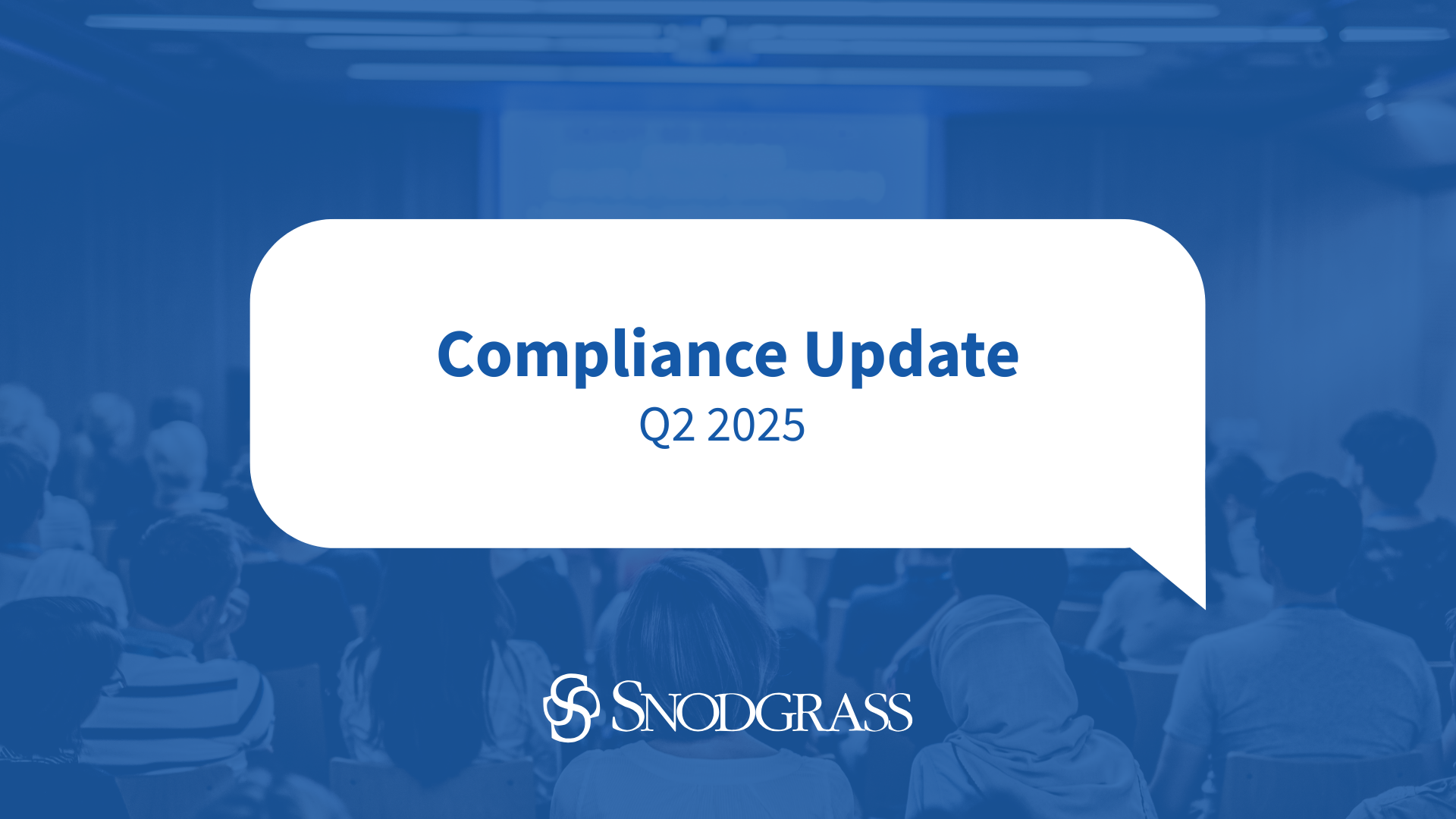SEC Provides Relief from ICFR Attestation for Smaller Reporting Companies
On Thursday, March 12, the Securities and Exchange Commission (SEC) adopted amendments to the accelerated filer and large accelerated filer definitions. The amendments are intended to more appropriately align the types of issuers that fall within the definitions of accelerated and large accelerated filers, thereby reducing unnecessary burdens and compliance costs for certain smaller issuers. However, another significant change relates to the external audit attestation requirement for internal controls over financial reporting.
As stated in the SEC release: “Following the adoption of the amendments, smaller reporting companies with less than $100 million in revenues will continue to be required to establish and maintain effective internal control over financial reporting (ICFR). Their principal executive and financial officers must continue to certify that, among other things, they are responsible for establishing and maintaining ICFR and have evaluated and reported on the effectiveness of the company’s disclosure controls and procedures. In addition, these smaller companies will continue to be subject to a financial statement audit by an independent auditor, who is required to consider ICFR in the performance of that audit. As a result of these amendments, and unlike larger issuers, these smaller companies will no longer be required to obtain a separate attestation of their ICFR from an outside auditor. These smaller issuers will be able to redirect the associated cost savings into growing their businesses. Business development companies will receive analogous treatment as a result of the amendments.”
SEC Chair Jay Clayton states, “The amendments represent an incremental, but meaningful, change that builds on the benefits of the JOBS Act for smaller public companies. The JOBS Act provided a well-reasoned exemption from the ICFR attestation requirement for emerging growth companies during the first five years after an IPO. These amendments would allow smaller reporting companies that have made it to that five-year point, but have not yet reached $100 million in revenues, to continue to benefit from that exemption as they build their businesses, while still subjecting those companies to important investor protection requirements.”
The final amendments will become effective 30 days after publication in the Federal Register; they apply to an annual report filing due on or after the effective date.
These amendments will provide significant relief for many companies. For financial institutions, it is important to consider the requirements of Part 363 of the Federal Deposit Insurance Corporation, which require, among other things, that an institution with total assets in excess of $1 billion, based on the beginning-of-the-year assets disclosed in the bank’s call report, continues to obtain an independent public accountant\’s report on the effectiveness of the institution\’s internal control structure over financial reporting. Therefore, the amendments may not provide the immediate relief hoped for by many financial institutions if an institution has total assets in excess of the $1 billion threshold. Financial institutions that may be impacted by these amendments should contact their external auditors to ensure that they fully understand the current requirements.
Guidance on COVID-19 Related Disclosures
The following excerpts come from the Division of Corporation Finance’s CF Disclosure Guidance: Topic No. 9 issued on March 25, 2020.
Introduction
Companies should consider the need for COVID-19-related disclosures within the context of the federal securities laws and our principles-based disclosure system. The cornerstone of this system is disclosure of material information that is widely disseminated.
The Commission has made clear that its disclosure requirements can apply to a broad range of evolving business risks even in the absence of a specific line item requirement that names the particular risk presented. In addition, a number of existing rules or regulations require disclosure about the known or reasonably likely effects of and the types of risks presented by COVID-19. As a result, disclosure of these risks and COVID-19-related effects may be necessary or appropriate in management’s discussion and analysis, the business section, risk factors, legal proceedings, disclosure controls and procedures, internal control over financial reporting, and the financial statements.
Assessing and Disclosing the Evolving Impact of COVID-19
Assessing the evolving effects of COVID-19 and related risks will be a facts and circumstances analysis. Disclosure about these risks and effects, including how the company and management are responding to them, should be specific to a company’s situation. As companies assess COVID-19-related effects and consider their disclosure obligations, questions to consider with respect to their present and future operations include:
- How has COVID-19 impacted your financial condition and results of operations? In light of changing trends and the overall economic outlook, how do you expect COVID-19 to impact your future operating results and near-and-long-term financial condition? Do you expect that COVID-19 will impact future operations differently than how it affected the current period?
- How has COVID-19 impacted your capital and financial resources, including your overall liquidity position and outlook? Has your cost of or access to capital and funding sources, such as revolving credit facilities or other sources changed, or is it reasonably likely to change? Have your sources or uses of cash otherwise been materially impacted? Is there a material uncertainty about your ongoing ability to meet the covenants of your credit agreements? If a material liquidity deficiency has been identified, what course of action has the company taken or proposed to take to remedy the deficiency? Consider the requirement to disclose known trends and uncertainties as it relates to your ability to service your debt or other financial obligations, access the debt markets, including commercial paper or other short-term financing arrangements, maturity mismatches between borrowing sources and the assets funded by those sources, changes in terms requested by counterparties, changes in the valuation of collateral, and counterparty or customer risk. Do you expect to disclose or incur any material COVID-19-related contingencies?
- How do you expect COVID-19 to affect assets on your balance sheet and your ability to timely account for those assets? For example, will there be significant changes in judgments in determining the fair-value of assets measured in accordance with U.S GAAP or IFRS?
- Do you anticipate any material impairments (e.g., with respect to goodwill, intangible assets, long-lived assets, right of use assets, investment securities), increases in allowances for credit losses, restructuring charges, other expenses, or changes in accounting judgments that have had or are reasonably likely to have a material impact on your financial statements?
- Have COVID-19-related circumstances such as remote work arrangements adversely affected your ability to maintain operations, including financial reporting systems, internal control over financial reporting and disclosure controls and procedures? If so, what changes in your controls have occurred during the current period that materially affect or are reasonably likely to materially affect your internal control over financial reporting? What challenges do you anticipate in your ability to maintain these systems and controls?
- Have you experienced challenges in implementing your business continuity plans or do you foresee requiring material expenditures to do so? Do you face any material resource constraints in implementing these plans?
- Do you expect COVID-19 to materially affect the demand for your products or services?
- Do you anticipate a material adverse impact of COVID-19 on your supply chain or the methods used to distribute your products or services? Do you expect the anticipated impact of COVID-19 to materially change the relationship between costs and revenues?
- Will your operations be materially impacted by any constraints or other impacts on your human capital resources and productivity?
- Are travel restrictions and border closures expected to have a material impact on your ability to operate and achieve your business goals?
The above list is illustrative but not exhaustive and each company will need to carefully assess COVID-19’s impact and related material disclosure obligations. The Division encourages disclosure that is tailored and provides material information about the impact of COVID-19 to investors and market participants. We also encourage companies to provide disclosures that allow investors to evaluate the current and expected impact of COVID-19 through the eyes of management, and that companies proactively revise and update disclosures as facts and circumstances change.
Reporting Earnings and Financial Results
Companies are reminded of their obligations under Item 10 of Regulation S-K and Regulation G with respect to the presentation of non-GAAP financial measures, as well as the Commission’s recent guidance with respect to performance metrics disclosure. To the extent a company presents a non-GAAP financial measure or performance metric to adjust for or explain the impact of COVID-19, it would be appropriate to highlight why management finds the measure or metric useful and how it helps investors assess the impact of COVID-19 on the company’s financial position and results of operations.
The provisional amount or range should reflect a reasonable estimate of COVID-19 related charges not yet finalized, such as impairment charges.



